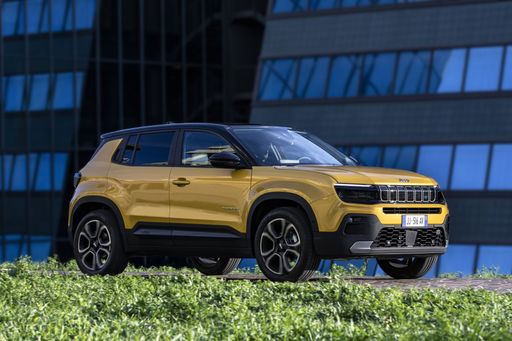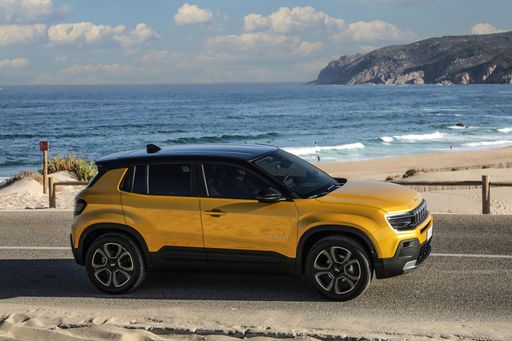Jeep Avenger vs Peugeot 208 - Differences and prices compared
Compare performance (156 HP vs 156 HP), boot space and price (21900 £ vs 20700 £ ) at a glance. Find out which car is the better choice for you – Jeep Avenger or Peugeot 208?
Costs and Efficiency:
Price and efficiency are often the first things buyers look at. Here it becomes clear which model has the long-term edge – whether at the pump, the plug, or in purchase price.
Peugeot 208 has a hardly perceptible advantage in terms of price – it starts at 20700 £ , while the Jeep Avenger costs 21900 £ . That’s a price difference of around 1260 £.
Fuel consumption also shows a difference: Peugeot 208 manages with 4.50 L and is therefore hardly perceptible more efficient than the Jeep Avenger with 4.90 L. The difference is about 0.40 L per 100 km.
In terms of energy consumption, the advantage goes to the Peugeot 208: with 14.10 kWh per 100 km, it’s slight more efficient than the Jeep Avenger with 15.50 kWh. That’s a difference of about 1.40 kWh.
As for electric range, the Peugeot 208 performs hardly perceptible better – achieving up to 432 km, about 32 km more than the Jeep Avenger.
Engine and Performance:
Under the bonnet, it becomes clear which model is tuned for sportiness and which one takes the lead when you hit the accelerator.
Both models deliver identical power – 156 HP each.
In acceleration from 0 to 100 km/h, the Peugeot 208 is barely noticeable quicker – completing the sprint in 8.30 s, while the Jeep Avenger takes 9 s. That’s about 0.70 s faster.
In terms of top speed, the Peugeot 208 performs hardly perceptible better – reaching 200 km/h, while the Jeep Avenger tops out at 194 km/h. The difference is around 6 km/h.
There’s also a difference in torque: Peugeot 208 pulls barely noticeable stronger with 270 Nm compared to 260 Nm. That’s about 10 Nm difference.
Space and Everyday Use:
Beyond pure performance, interior space and usability matter most in daily life. This is where you see which car is more practical and versatile.
Both vehicles offer seating for 5 people.
In curb weight, Peugeot 208 is barely noticeable lighter – 1165 kg compared to 1180 kg. The difference is around 15 kg.
In terms of boot space, the Jeep Avenger offers hardly perceptible more room – 380 L compared to 352 L. That’s a difference of about 28 L.
In maximum load capacity, the Jeep Avenger performs slight better – up to 1277 L, which is about 114 L more than the Peugeot 208.
When it comes to payload, Jeep Avenger somewhat takes the win – 502 kg compared to 430 kg. That’s a difference of about 72 kg.
Who wins the race in the data check?
The Peugeot 208 sits just ahead overall in the objective data comparison.
This result only shows which model scores more points on paper – not which of the two cars feels right for you.
Costs and Consumption
View detailed analysis
Engine and Performance
View detailed analysis
Dimensions and Body
View detailed analysis

Peugeot 208
Jeep Avenger
The Jeep Avenger shrinks Jeep's boxy, adventurous styling into a city-friendly electric crossover that looks just as at home on tight streets as it does on muddy weekend lanes. It's a savvy pick for drivers who want go-anywhere attitude without the truck-size ego — practical inside, lively around town and ready to tackle a bit of rough stuff when the mood strikes.
details




Peugeot 208
The Peugeot 208 feels like a city-savvy fox: compact, stylish and surprisingly grown-up, with a cabin that punches above its weight and enough personality to make daily commutes a little less boring. It’s a smart pick for buyers who want chic practicality without the showroom bluster — easy to park, thrifty to run and oddly fun when the road tightens up.
details



Costs and Consumption |
|
|---|---|
|
Price
21900 - 36900 £
|
Price
20700 - 35200 £
|
|
Consumption L/100km
4.9 - 5.7 L
|
Consumption L/100km
4.5 - 5.2 L
|
|
Consumption kWh/100km
15.50 kWh
|
Consumption kWh/100km
14.1 - 15.4 kWh
|
|
Electric Range
400 km
|
Electric Range
362 - 432 km
|
|
Battery Capacity
51 kWh
|
Battery Capacity
46 - 51 kWh
|
|
co2
0 - 129 g/km
|
co2
0 - 117 g/km
|
|
Fuel tank capacity
44 L
|
Fuel tank capacity
44 L
|
Dimensions and Body |
|
|---|---|
|
Body Type
SUV
|
Body Type
Hatchback
|
|
Seats
5
|
Seats
5
|
|
Doors
5
|
Doors
5
|
|
Curb weight
1180 - 1520 kg
|
Curb weight
1165 - 1530 kg
|
|
Trunk capacity
325 - 380 L
|
Trunk capacity
309 - 352 L
|
|
Length
4084 - 4088 mm
|
Length
4055 mm
|
|
Width
1776 mm
|
Width
1745 mm
|
|
Height
1527 - 1541 mm
|
Height
1430 mm
|
|
Max trunk capacity
1218 - 1277 L
|
Max trunk capacity
1118 - 1163 L
|
|
Payload
494 - 502 kg
|
Payload
380 - 430 kg
|
Engine and Performance |
|
|---|---|
|
Engine Type
Electric, Petrol, Petrol MHEV
|
Engine Type
Petrol, Electric, Petrol MHEV
|
|
Transmission
Automatic, Manuel
|
Transmission
Manuel, Automatic
|
|
Transmission Detail
Reduction Gearbox, Manual Gearbox, Dual-Clutch Automatic
|
Transmission Detail
Manual Gearbox, Reduction Gearbox, Dual-Clutch Automatic
|
|
Drive Type
Front-Wheel Drive, All-Wheel Drive
|
Drive Type
Front-Wheel Drive
|
|
Power HP
100 - 156 HP
|
Power HP
101 - 156 HP
|
|
Acceleration 0-100km/h
9 - 10.6 s
|
Acceleration 0-100km/h
8.3 - 10.9 s
|
|
Max Speed
150 - 194 km/h
|
Max Speed
150 - 200 km/h
|
|
Torque
205 - 260 Nm
|
Torque
205 - 270 Nm
|
|
Number of Cylinders
3
|
Number of Cylinders
3
|
|
Power kW
74 - 115 kW
|
Power kW
74 - 115 kW
|
|
Engine capacity
1199 cm3
|
Engine capacity
1199 cm3
|
General |
|
|---|---|
|
Model Year
2023 - 2025
|
Model Year
2023 - 2025
|
|
CO2 Efficiency Class
A, D, C
|
CO2 Efficiency Class
D, A, C
|
|
Brand
Jeep
|
Brand
Peugeot
|
What drivetrain options does the Jeep Avenger have?
Available configurations include Front-Wheel Drive or All-Wheel Drive.




